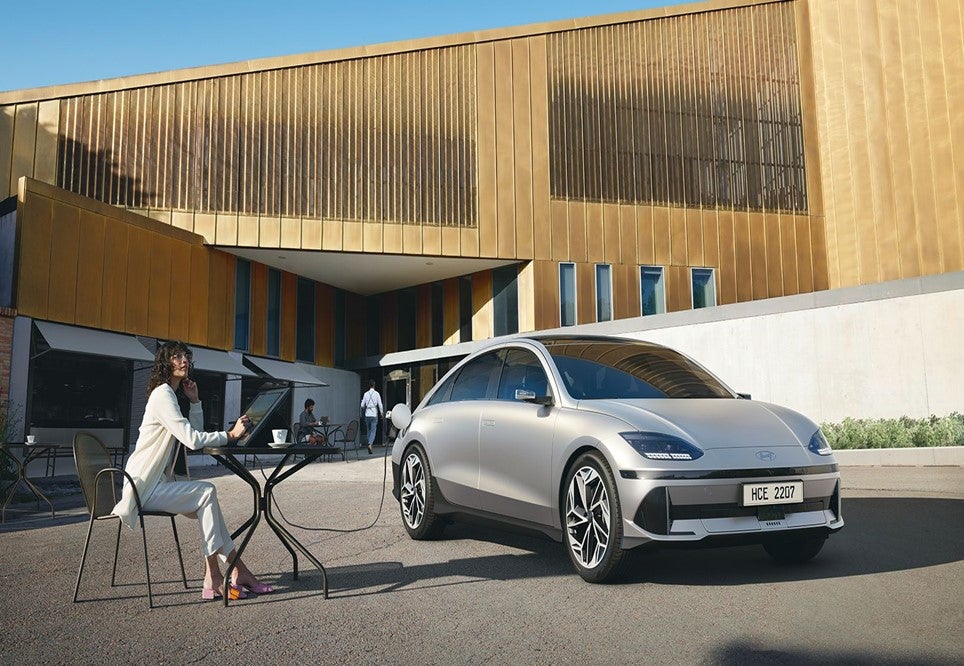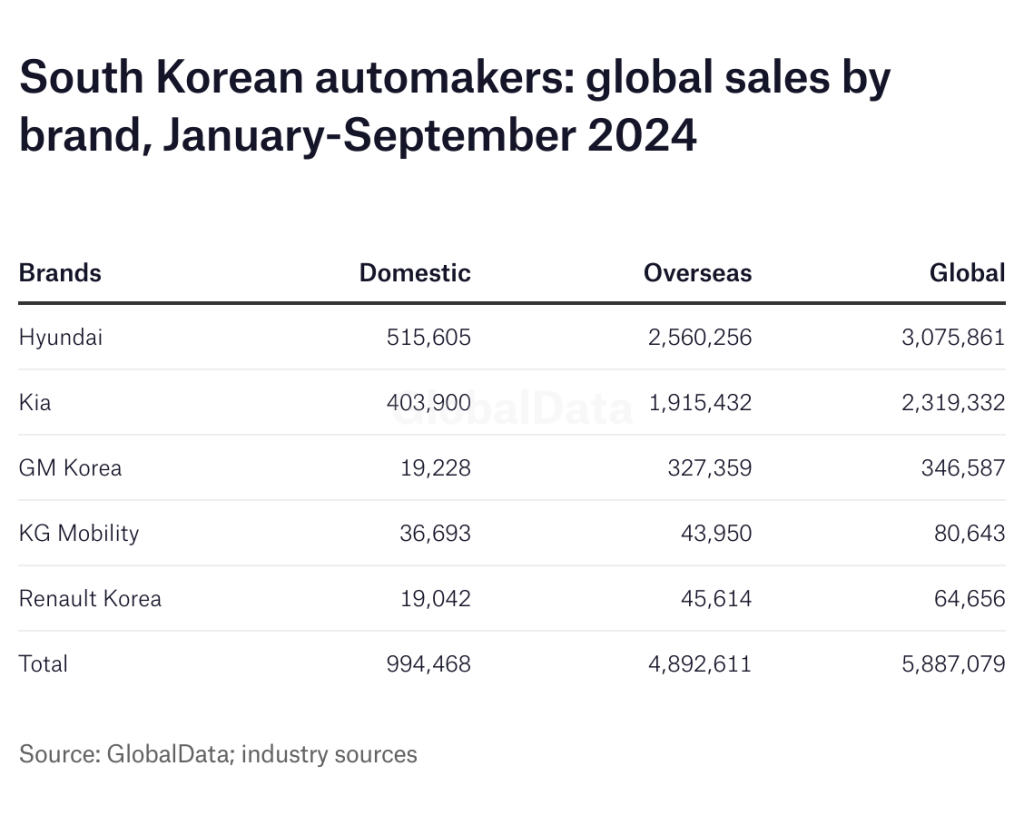
Domestic sales by South Korea’s five main automakers combined fell slightly to 106,148 units in September 2024 from 106,950 year earlier, according to preliminary data released individually by the manufacturers. The data does not include sales by South Korea’s low-volume commercial vehicle manufacturers including Tata-Daewoo and Edison Motors, while import brands are covered in a separate report later in the month.
The market decline has slowed significantly in the last three months after much steeper drops in the first half of the year, reflecting mainly lower year-earlier volumes, while Hyundai’s sales have begun to rebound after a weak first half. Economic growth in the country slowed to 2.3% year-on-year in the second quarter from 3.3% in the first quarter, reflecting sluggish domestic consumption with highly-indebted consumers under pressure from the central bank’s interest rate hikes in the last two years.

Discover B2B Marketing That Performs
Combine business intelligence and editorial excellence to reach engaged professionals across 36 leading media platforms.
Cumulative nine-month sales were down by 9% at 994,468 from 1,090,547 units, with Hyundai’s sales also declining by 9% to 515,605 units while Kia’s sales fell by 6% to 403,900 units. GM Korea reported the sharpest decline year-to-date (YTD), of 34% to 19,228 units, while KG Mobility’s sales were down by 28% at 36,693 units. Only Renault Korea reported a sales rise, of 11% at 19,042 units from very weak year earlier levels, helped by the recent launch of the new Grand Koleos SUV.
Global sales by the country’s “big-five” automakers, including vehicles produced overseas by Hyundai and Kia, fell by 1.3% to 5,887,079 units in the first nine months of the year from 5,965,411 in the same period of 2023, with overseas sales slightly lower at 4,892,611 from 4,897,589 units.

Hyundai Motor’s global sales fell by 4% to 343,824 units in September from 357,133 a year earlier, with a sharp drop in overseas sales more than offsetting higher domestic deliveries. South Korea’s leading automaker also said it sold 17,000 BEVs globally last month. Total volumes in the first nine months of 2024 declined by 2% to 3,075,861 from 3,127,036 previously. Last month the company celebrated its 100 millionth delivery, an IONIQ 5, to a domestic customer.
Domestic sales increased for the second consecutive month in September after several months of decline, by close to 4% to 55,805 units from 53,911 a year earlier, including 10,638 Genesis-branded vehicles and 45,167 Hyundais – of which 20,085 were SUVs. Cumulative nine-month sales were still down by almost 9% at 515,605 from 563,519 units.
Overseas sales fell by 5% to 288,019 units in September from 303,222 a year earlier, while YTD volumes were just slightly lower at 2,560,256 units from 2,563,517 units – underpinned by strong demand in North and South America and in India earlier in the year.
Hyundai this year set out to 4.24 million vehicles globally in 2024, a slight increase on last year’s volumes. It now aims to sell 704,000 vehicles domestically and 3.54 million overseas, helped by the anticipated completion of a new EV plant in the US state of Georgia in the fourth quarter. Last month the company reduced its longer-term annual global sales forecasts, by 6% to 5.5 million vehicles by 2030, in view of the sluggish global uptake in battery electric vehicles (BEVs) and rising competition from Chinese automakers in key global markets.
Hyundai began deliveries of its new Casper A-segment BEV in August and plans to introduce the IONIQ 3 and IONIQ 7 BEVs by the end of the year. The company revealed last month it plans to increase profitability by diversifying its hybrid and EV lineups and “continuing to improve its regional and product mix, optimize production and enhance its product mix with more SUVs and luxury models”.
Kia’s global sales fell by over 4% to 249,842 units in September from 261,479 a year earlier, with domestic and overseas sales both lower. The Sportage SUV remained its best-selling model globally last month with 47,207 deliveries, followed by the Seltos with 23,303 sales and the Sorento with 23,069 units. Total sales in the first nine months of the year were more than 1% lower at 2,319,332 units from 2,354,229, including 4,000 special-purpose vehicles (SPVs) such as military and municipal trucks.
Domestic sales, including a small number of SPV exports, dropped by 13% to 38,840 units last month from 44,687 a year earlier, with the Sorento, Carnival MPV and K8 sedan its best-selling models. Domestic sales were 6% lower at 403,900 units YTD from 429,860 previously.
Overseas sales fell by 3% to 211,002 units in September from 216,792 a year earlier, while cumulative nine-month volumes were just slightly lower at 1,915,432 units from 1,924,369 – with the Sportage and Seltos SUVs and the K3 sedan its best-selling overseas models.
Earlier this year Kia said it aimed to sell 3.2 million vehicles in 2024, including 530,000 domestically, 2,663,000 overseas and a further 7,000 SPVs globally. The company’s medium-term plan is to sell 4.3 million vehicles annually by 2030, of which 1.6 million are expected to be BEVs.
The company began deliveries of its new EV3 compact battery-powered SUV in South Korea in July, with sales in Europe scheduled to begin in the fourth quarter. Kia also confirmed it plans to launch the new Sportage before the end of the year, followed by the EV4, the K4 sedan and Tasman pickup next year.
GM Korea’sglobal sales increased by 7% to 38,967 vehicles in September from 36,544 a year earlier, after plunging sharply in the previous two months due mainly to partial strikes. Full production resumed in early September after a wage agreement was reached with its labour unions. Sales in the first nine months of the year were just 7% higher at 346,587 units from 323,271 units, with the recent sharp declines wiping out most of the strong gains earlier in the year.
Local sales continued to fall sharply last month, by 26% to 1,958 units from 2,632 units a year earlier, while YTD volumes were down by 34% at 19,228 units from 29,056 units – reflecting strong competition from Hyundai-Kia and from imports as well as the recent production stoppages. The company produces two main models, the Trax Crossover and the Trailblazer SUV, and imports the Colorado pickup, Equinox, Traverse and Tahoe SUVs, as well as the GMC Denali pickup.
Exports increased by 9% to 37,009 units in September from 33,912 a year earlier and were up by 11% at 327,359 units YTD from 294,215 – reflecting strong overseas deliveries of Trax Crossover in the first half of the year.
The company said it aims to make up most of the lost production from the strikes in the final months of the year. Earlier this year the automaker set a global sales target of 529,200 vehicles for 2024 – up by 13% from last year’s 468,059 units.
KG Mobility reported a20% fall in global sales to 7,637 vehicles in September from 9,583 units a year earlier, reflecting sharply lower overseas sales, while cumulative nine-month volumes were down by 16% at 80,643 from 96,219 units. The company, previously known as Ssangyong Motor, was acquired in late 2022 by a consortium led by local steel and chemicals firm KG Group.
Domestic sales increased by 11% to 4,535 vehicles last month from 4,069 units a year earlier, helped by the recent launch of the new Actyon SUV and a new minivan version of the Torres EVX SUV, while cumulative nine-month volumes were still down by 28% at 36,693 YTD from 50,984 units – reflecting weak overall demand and strong competition from other domestic manufacturers and importers.
Exports continued to plunge in September, by 44% to 3,102 units from 5,514 a year earlier, as BEV demand in Europe continued to weaken, while YTD volumes were down by just 3% at 43,950 from 45,415 units. The company, which also exports to Australia and to markets in the Middle-East, earlier this year said it plans to “explore new markets in Latin America” to help strengthen global sales. Last month the company signed an agreement to supply over 2,000 Rexton Sports pickup trucks to the Peruvian Army by next year.
Renault Korea‘s global sales fell by 5% to 8,625 vehicles in September from 9,105 units a year earlier, with a strong surge in domestic deliveries more than offset by a plunge in exports. Total sales in the first nine months of the year were down by 26% at 64,656 units from 87,201 units.
Domestic sales surged threefold to 5,010 vehicles last month from 1,651 units a year earlier, following the recent launch of the new Grand Koleos hybrid SUV, while YTD sales were up by 11% at 19,042 units from 17,128 previously. The company planned to add a gasoline version of the Grand Koleos last month.
Exports plunged 52% to 3,615 units in September from 7,454 units a year earlier, mostly shipments of the Arkana hybrid crossover vehicle (a rebadged XM3), while YTD exports were down by 35% at 45,614 units from 70,073 units.
Earlier this year Renault Korea confirmed it will continue to overhaul its product range with a strong focus on SUVs, BEVs and hybrid vehicles, starting with the new Geely-based Grand Koleos hybrid SUV in July and the phasing out its aging SM6 mid-size sedan this year. The company recently agreed with Geely to produce the Polestar 4 BEV at its Busan plant from the second half of 2025, for sale domestically and for export.






